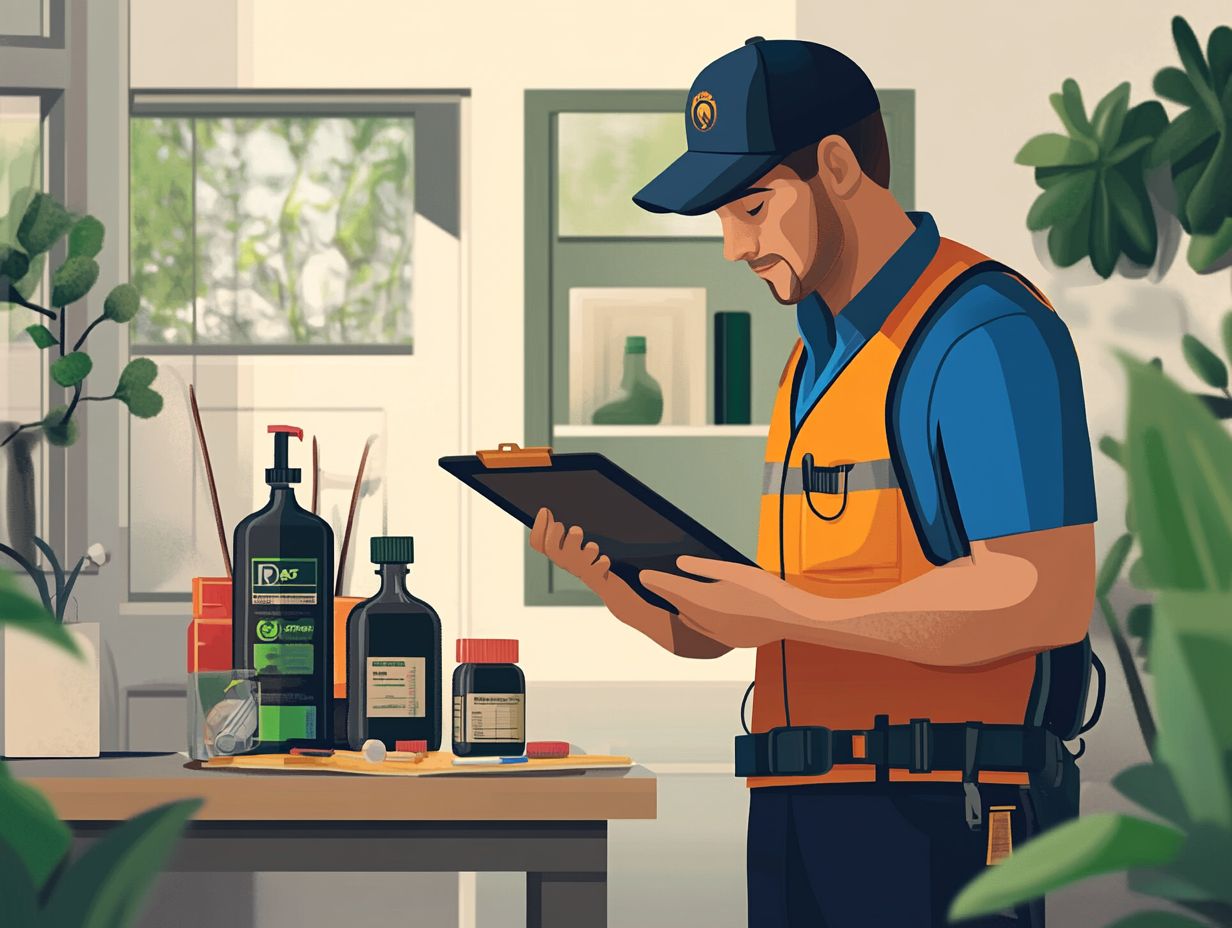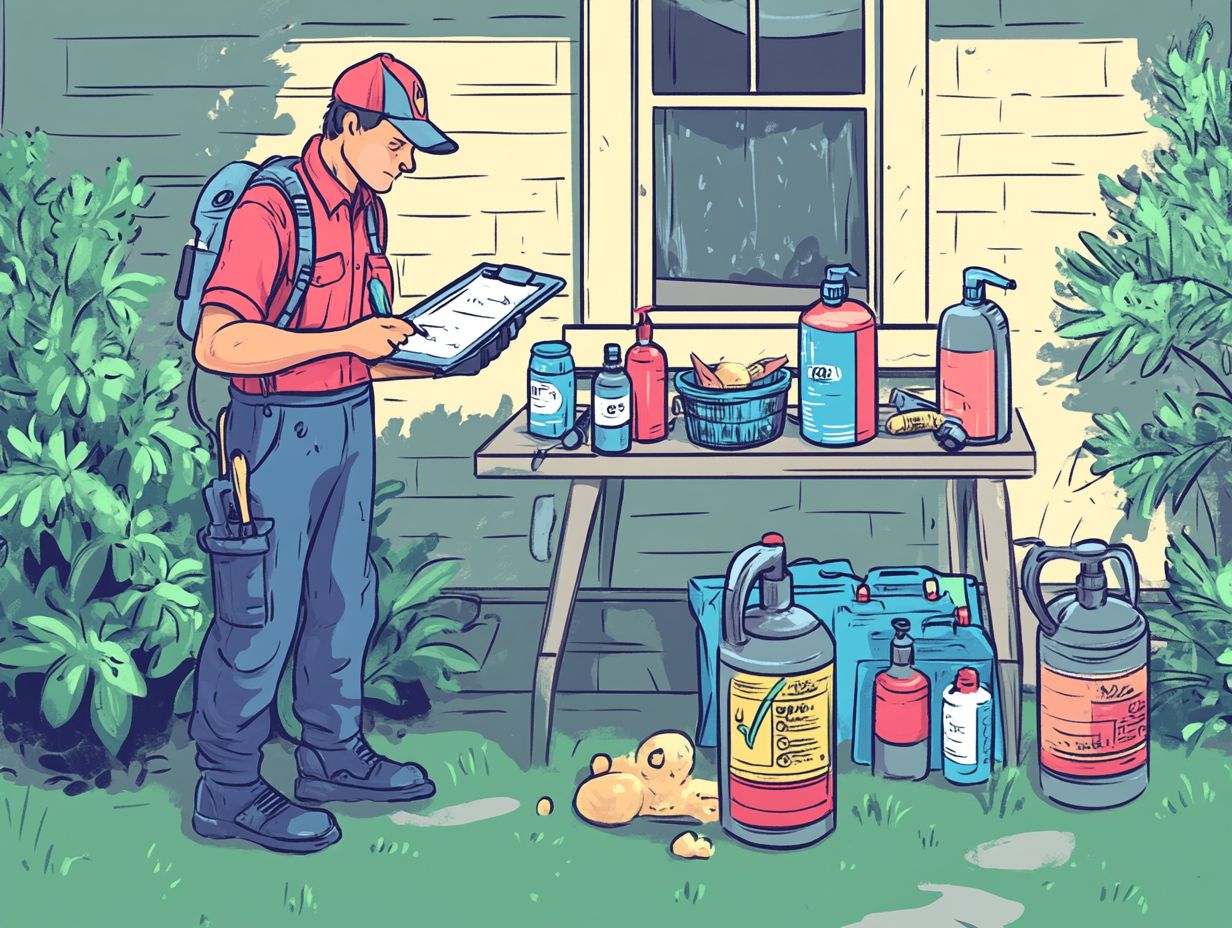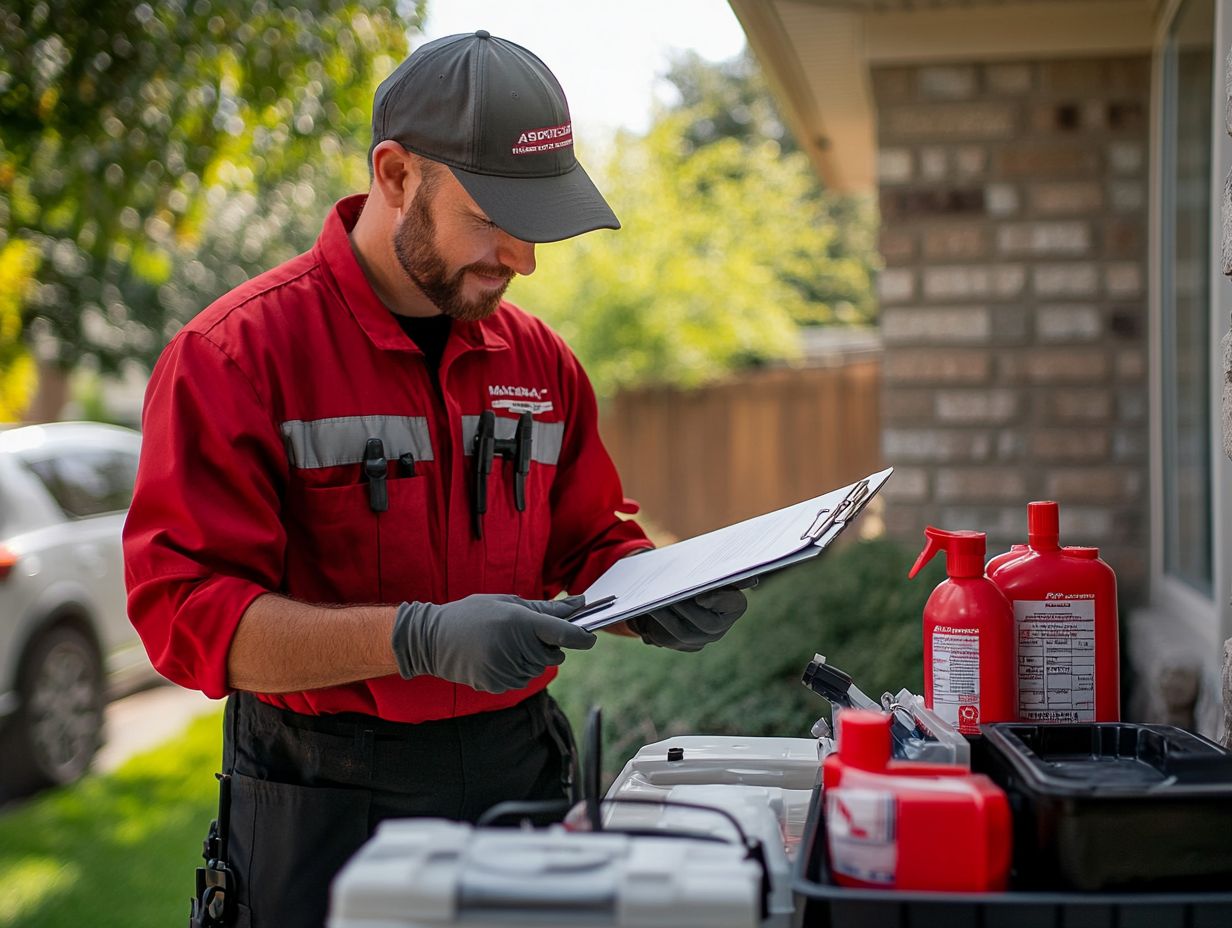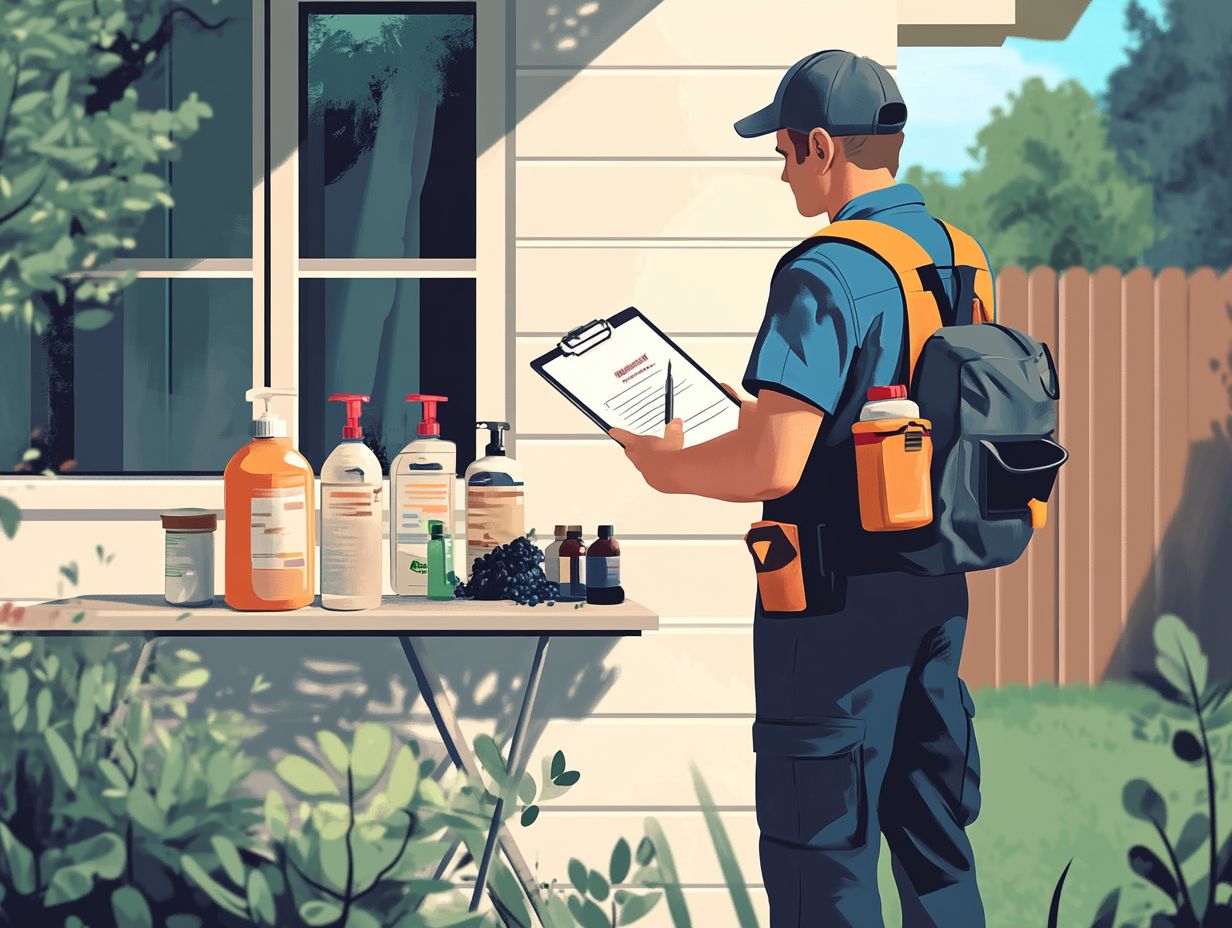Pest control isn’t just about keeping your home free from unwanted visitors; it’s essential for your health, safety, and protecting your property.
Common pests like rodents, insects, and termites can really cause chaos if you let them run wild.
In this discussion, you’ll dive into why effective pest control matters, explore the different methods available—everything from chemical to biological—and uncover the key steps involved in pest control sales.
You’ll also learn what qualities make a great pest control salesperson and why their expertise is so crucial in this industry.
Why Is Pest Control Important?

Pest control is essential for keeping your space safe and healthy. It helps you manage those pesky infestations that could pose serious health risks and environmental issues.
With effective pest management, you can keep common intruders like rodents, insects, and termites at bay, preventing potential diseases and even structural damage to your property.
By using smart pest prevention strategies, professional pest control companies can offer treatment options tailored to your residential or commercial needs, ultimately helping you create a healthier living and working environment.
What Are The Common Pests That Need To Be Controlled?
Regarding pest control, you'll want to keep an eye out for common troublemakers like rodents, insects, and termites. If you let these guys go unchecked, they can cause some serious damage to your home or business. Understanding how pests behave and what makes them tick is super important for identifying them and figuring out the best way to get rid of them. Each type of pest brings its own set of challenges and risks, which means you’ll need to tailor your pest management strategies accordingly.
Take ants, for example. These little socialites communicate using pheromones, which helps them form complex colonies and skillfully find their way to food. Then there are cockroaches, who love damp spaces and have a talent for multiplying quickly, making them a real headache to deal with once they move in.
And let's not forget about rodents like rats and mice; they don't just munch on your food and create messes—they also have a knack for gnawing on wires and insulation, which can lead to fire hazards. Termites are the ultimate stealthy villains, often called silent destroyers, and can wreak havoc on your home’s structure by feeding on wood and other cellulose materials.
So, getting to know these pests and their life cycles is key for taking effective control and prevention measures.
What Are The Different Types Of Pest Control?
You have a variety of pest control methods at your disposal, each tailored to tackle specific pest problems while keeping the environment and safety in mind.
If you need a quick fix, chemical pest control uses pesticides to get rid of pests fast.
On the other hand, if you're looking for something more sustainable, biological pest control relies on natural predators or parasites to keep those unwanted guests in check.
Then there’s physical pest control, which includes barriers and traps that stop pests from getting in or capture them without any chemicals.
All of these methods play a key role in integrated pest management strategies that strike a balance between effectiveness and ecological responsibility.
1. Chemical Pest Control
Chemical pest control is a method you might want to consider if you're looking to tackle those pesky critters effectively. It involves applying pesticides to get rid of pest populations quickly. However, it's super important to understand the safety measures and regulations that come with pesticide use to protect both your health and the environment. Choosing the right pest control products is key to ensuring they work well while keeping risks to a minimum.
You'll find a variety of chemical pest control products on the market, like insecticides that are tailored for specific insects and rodenticides that help manage rodent populations. When you're thinking about using these products, make sure to pick ones that are EPA-approved, since they meet strict safety and effectiveness standards. It’s also a good idea to get familiar with the proper application techniques to avoid unnecessary exposure to chemicals. This includes wearing protective gear and applying them at the recommended times.
By keeping regulatory considerations in mind, you can use pesticides responsibly and help safeguard the health of non-target species and the surrounding ecosystem.
2. Biological Pest Control
Biological pest control is a great eco-friendly approach that uses natural predators or parasites to keep pest populations in check sustainably. This method fits nicely with integrated pest management principles, focusing on long-term solutions while keeping chemical use to a minimum.
By understanding pest ecology and the relationships between different species, you can effectively incorporate biological pest control into a broader pest management strategy.
Using the natural dynamics of ecosystems, this approach not only tackles pest-related problems but also encourages biodiversity, which is essential for maintaining a resilient environment. For example, introducing ladybugs to control aphid populations in agricultural settings has been a successful strategy, showing how choosing the right predators can lead to balanced pest management.
There are plenty of case studies that highlight how parasitic wasps can effectively suppress caterpillar infestations, showing their importance in keeping crops healthy. Plus, using microbial pathogens as biological agents can specifically target pests without harming non-target organisms, really highlighting the ecological benefits of this method.
3. Physical Pest Control

You can take charge of pest control by using physical methods like traps, barriers, and exclusion techniques to keep those unwanted guests at bay. This approach focuses on prevention, which means you can significantly cut down on the need for chemical treatments. It’s a safer, more sustainable way to handle pest issues, protecting both your home and business from potential damage.
Traps come in all shapes and sizes, from sticky boards for catching pesky insects to live-catch traps for those furry rodents. You can also set up barriers, like netting or screens, to physically block pests from sneaking inside, and use exclusion techniques to seal up entry points that pests might find.
To really up your game, regular inspections and maintenance are key for catching any potential infestations early on. When you weave these physical strategies into a comprehensive pest management plan, you’re not just tackling the current problems; you’re also preventing future ones. It’s all about being smart and responsible in your approach to pest management.
What Are The Steps Involved In Pest Control Sales?
The steps you take in pest control sales are key to successfully providing pest management solutions to your clients. It all starts with an initial inspection where you identify the pest problems and figure out the most effective treatment plan.
After that assessment, you’ll create a tailored strategy that meets the specific needs of your customer. Then comes the implementation, followed by follow-up to make sure your customers are satisfied and stick around.
Throughout this entire sales process, strong customer service and effective lead generation techniques are essential for your success.
1. Inspection and Identification of Pests
The first step in your pest control sales journey is to conduct a thorough inspection and accurately identify the pests. This is absolutely essential for effective pest management. When you understand the behavior and biology of pests, you can better determine how bad the infestation is and pick the right treatment methods. Proper pest identification is key to crafting a successful pest control strategy that meets your client's specific needs.
You’ll want to look for signs like droppings, gnaw marks, and those mysterious sounds that hint at various pest species lurking around. Getting familiar with their habits—like where they prefer to nest and what they like to munch on—helps you predict their movements and activities. For example, knowing the seasonal patterns of rodents can guide you on when to implement preventative measures.
By using identification techniques such as visual inspections, traps, and pheromone lures, you can take a comprehensive approach to pest control. By understanding all these factors, you can come up with more effective treatment solutions, ultimately creating a healthier environment for your clients.
2. Developing a Treatment Plan
Developing a treatment plan is a critical step in your pest control sales process. It outlines the specific methods and techniques you'll use to tackle your client's pest problems. This plan should be customized to fit the unique needs of each customer and consider the types of pests you identified during the inspection.
Effective communication with your client about the proposed solutions is key to building their confidence in the pest control services you provide.
To create a comprehensive strategy, it’s essential to include a mix of pest control methods like chemical treatments, baiting systems, and traps, each selected based on the specific behavior and habitat of the pests. You might also want to integrate an Integrated Pest Management (IPM) approach, which combines biological, mechanical, and chemical strategies for a more sustainable solution.
Educating your clients about what they can expect and any potential follow-up treatments will not only help build trust but also give them the tools to maintain a pest-free environment. Regular check-ins and updates on the treatment progress can further enhance customer satisfaction and show your commitment to long-term pest management.
3. Implementation of Pest Control Methods
When you implement pest control methods, that’s where the proposed treatment plan really comes to life. You’ll want skilled pest control technicians to handle the necessary procedures safely and effectively. During this phase, it’s crucial to stick to established safety measures and guidelines to protect both the environment and your health. Effective pest treatment not only tackles current infestations but also sets the stage for long-term pest prevention.
To get the best results, technicians use a mix of techniques, like targeted chemical applications, baiting strategies, and eco-friendly alternatives, all tailored to your specific pest problem. Their training helps them assess the situation accurately and pick the best method for eradication while keeping risks to a minimum. Following safety protocols, such as wearing protective gear and handling chemicals safely, is key.
These precautions not only protect the technicians but also ensure that the surrounding environment stays clean and safe for everyone. By maintaining rigorous safety standards, pest control professionals enhance the overall effectiveness of their services, ultimately promoting a healthier living space for you.
4. Follow-up and Maintenance

Follow-up and maintenance are vital steps in your pest control sales process. They help ensure that the pest control methods you've implemented really work over time. Regular follow-ups give you the chance to check in on how the treatment is going and make any necessary tweaks.
Providing strong customer service and ongoing support is key to building long-term relationships with your clients, helping them keep their spaces pest-free with proactive prevention measures.
These follow-up visits aren’t just about checking effectiveness; they’re also a great opportunity to educate your customers about the signs of potential infestations. When you arm them with knowledge about pest behavior and prevention strategies, you give the power to them to take action quickly if needed.
Staying engaged through maintenance plans not only builds trust but also reassures your customers that their investment matters.
This commitment to ongoing care boosts customer satisfaction, leading to higher retention rates and positive word-of-mouth referrals. That can really help expand your pest control business's customer base.
What Are The Qualities Of A Successful Pest Control Salesperson?
A successful pest control salesperson has a special mix of qualities that help you connect with clients and offer customized pest management solutions. You’ll want to have a solid understanding of various pests and the methods to control them, along with top-notch communication skills.
Being able to work independently is also key. Plus, your problem-solving skills and dedication to educating customers will go a long way in building trust and keeping clients satisfied throughout the pest control process.
1. Knowledge of Different Pests and Control Methods
Having a solid understanding of different pests and how to control them is crucial for you as a pest control salesperson. It helps you provide clients with accurate and relevant information that they really need. When you grasp pest biology and behavior, you can anticipate what concerns they might have and offer effective pest management solutions that fit their specific needs.
This foundational knowledge not only boosts your confidence but also builds trust with clients who are looking for reliable advice. By knowing the life cycles, habits, and environmental triggers of various pests, you can effectively convey the urgency of certain situations and recommend the best preventative measures available.
With this informed approach, you can have more engaged and productive conversations with clients, leading to better decision-making on their part. When clients see that their concerns are being addressed by someone knowledgeable, they’re much more likely to feel reassured and satisfied with the whole pest control experience.
2. Excellent Communication and Sales Skills
Excellent communication and sales skills are crucial for you as a pest control salesperson. They help you build strong relationships with clients and boost overall customer service. When you can effectively share information about pest control methods and treatment options, you not only build trust but also guide your clients through the sales process, helping them make informed decisions.
These abilities are key to ensuring that your clients feel heard and understood, allowing you to customize solutions that fit their specific needs. Strategies like active listening, empathetic engagement, and clearly explaining complex concepts can turn a one-time interaction into a long-term partnership.
By honing these skills, you can significantly improve customer satisfaction, leading to positive word-of-mouth and repeat business. When you master the art of communication, you enhance your sales results and contribute to a seamless, enjoyable customer experience, ultimately fostering loyalty in a competitive market.
3. Ability to Work Independently
The ability to work independently is a key trait for you as a successful pest control salesperson. It shows that you have self-motivation and can manage your time effectively. As a pest control technician, you'll find yourself in all sorts of environments, and being able to assess situations on your own and respond without constant supervision is essential.
In this fast-paced field, being self-reliant lets you make quick decisions and tackle problems as they pop up, which really boosts your effectiveness on the job. When unexpected challenges come your way, you can quickly come up with solutions, leading to happier clients and building their trust in you. Your self-motivation drives you to engage with customers constantly, which is crucial for bringing in new business.
By actively seeking out opportunities and following through on leads, you can build a strong sales pipeline, propelling your success in the competitive pest control industry.
4. Attention to Detail and Problem-Solving Skills

Attention to detail and strong problem-solving skills are crucial for you as a successful pest control salesperson. These qualities help you accurately assess pest infestations and come up with tailored solutions for your clients. By carefully evaluating each situation, you can spot underlying issues and recommend the right pest management strategies, which ultimately enhances your customer service.
When you're tackling a pest problem, being able to notice even the tiniest signs of an infestation can lead to more effective and long-lasting solutions. For example, recognizing a pattern in pest behavior not only helps you craft a specific treatment plan but also give the power tos your clients with knowledge that can build their satisfaction and trust.
This proactive approach ensures your recommendations are practical and customized for each unique circumstance, resulting in quicker resolution times and reducing the chances of recurring issues. Happy customers are more likely to spread the word, which only strengthens the reputation of your pest control service.
Frequently Asked Questions
What is pest control sales?
Pest control sales is the process of selling products and services related to the management and elimination of pests, such as insects, rodents, and other unwanted creatures.
What are some common products sold in pest control sales?
Some common products sold in pest control sales include insecticides, rodenticides, traps, and other equipment used for pest management and control.
What services are typically offered in pest control sales?
Pest control sales often includes services such as inspections, treatments, and ongoing maintenance to prevent and control pest infestations.
How can I become successful in pest control sales?
To be successful in pest control sales, it is important to have strong communication and customer service skills, as well as knowledge of pest management and the ability to effectively sell products and services to clients.
What are some common challenges in pest control sales?
Some common challenges in pest control sales include convincing potential customers of the value of pest control services, dealing with difficult or skeptical clients, and keeping up with industry regulations and advancements.
What are the benefits of using pest control sales?
Using pest control sales can help to protect homes and businesses from harmful and destructive pests, maintain a healthy and safe environment, and provide peace of mind for customers.

